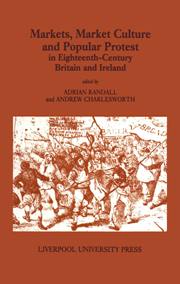Book contents
- Frontmatter
- Contents
- Contributors
- Preface
- 1 Markets, Market Culture and Popular Protest in Eighteenth-Century Britain and Ireland
- 2 Popular Protest and the Persistence of Customary Corn Measures: Resistance to the Winchester Bushel in the English West
- 3 The Jack-a-Lent Riots and Opposition to Turnpikes in the Bristol Region in 1749
- 4 The Cider Tax, Popular Symbolism and Opposition in Mid-Hanoverian England
- 5 Scarcity and the Civic Tradition: Market Management in Bristol, 1709–1815
- 6 The Moral Economy of the English Middling Sort in the Eighteenth Century: the Case of Norwich in 1766 and 1767
- 7 Oxford Food Riots: a Community and its Markets
- 8 The Irish Famine of 1799–1801: Market Culture, Moral Economies and Social Protest
- Index
7 - Oxford Food Riots: a Community and its Markets
- Frontmatter
- Contents
- Contributors
- Preface
- 1 Markets, Market Culture and Popular Protest in Eighteenth-Century Britain and Ireland
- 2 Popular Protest and the Persistence of Customary Corn Measures: Resistance to the Winchester Bushel in the English West
- 3 The Jack-a-Lent Riots and Opposition to Turnpikes in the Bristol Region in 1749
- 4 The Cider Tax, Popular Symbolism and Opposition in Mid-Hanoverian England
- 5 Scarcity and the Civic Tradition: Market Management in Bristol, 1709–1815
- 6 The Moral Economy of the English Middling Sort in the Eighteenth Century: the Case of Norwich in 1766 and 1767
- 7 Oxford Food Riots: a Community and its Markets
- 8 The Irish Famine of 1799–1801: Market Culture, Moral Economies and Social Protest
- Index
Summary
Many factors determined the incidence and character of eighteenth-century food riots. Most obviously, dearth, with its accompanying high prices and supply breakdowns, almost inevitably underlay outbreaks of food-related disturbances. Oxford's food riots certainly took place in the context of scarcity which not only produced straightforward effects on prices but also distorted normal patterns of marketing and trade. However, it is the aim of this paper to concentrate on three interconnected themes which ran through the Oxford disturbances and which together help to explain both why the city should have been prone to riot and the way in which rioters and authorities responded to crisis. The first theme is the clash between the food needs and expectations of the local community and the demands made on local supplies by distant and perhaps more attractive markets. The second is the long tradition of market regulation in Oxford which provided both the crowd and the authorities with an accessible and intelligible set of ideas about how marketing and trade should operate to which both could refer in dearth. The behaviour of the Oxford rioters provides support for E. P. Thompson's view that there was a ‘moral economy’ of the crowd, which involved a restatement of the paternalist tradition of market regulation and questioned free market values. It will also be suggested that Oxford's tradition of market regulation may have helped in the formulation of the ideas, which can be encompassed within the term ‘moral economy’.
- Type
- Chapter
- Information
- Markets, Market Culture and Popular Protest in Eighteenth-Century Britain and Ireland , pp. 137 - 162Publisher: Liverpool University PressPrint publication year: 1996
- 2
- Cited by

